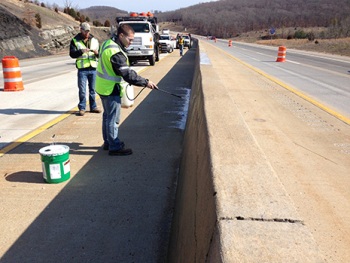May 30 2013
Micah Hale, associate professor of civil engineering in the College of Engineering at the University of Arkansas, and graduate student Richard Deschenes are working with the Arkansas State Highway and Transportation Department to find ways to repair cracking on the barrier wall on Interstate 540, just north of the Bobby Hopper tunnel.
 Deschenes’ research involves testing different treatments to prevent and repair damage to this barrier wall on I-540.
Deschenes’ research involves testing different treatments to prevent and repair damage to this barrier wall on I-540.
This wall is affected by a process called an alkali silica reaction. Silica, an acidic material found in most types of rocks and sand used to make concrete, can react with the alkaline chemicals in cement to form a gel. This gel attracts water and then expands, causing cracks in the concrete. The cracks in the wall can be repaired with grout, but first this expansion must be stopped.
Under Hale’s mentorship, Deschenes and other researchers are monitoring the degree of cracking on the wall, and testing several methods of reducing the amount of moisture inside the concrete. They are treating sections of the wall with different materials, including silane sealer, linseed oil or elastomeric paint. These treatments will prevent the concrete from absorbing water, but they will also allow the water already inside the concrete to escape.
Once researchers have found an effective way to reverse the damage on the barrier, they will apply the same treatment to the roadway, which is also beginning to expand due to the alkali silica reaction.
In addition to finding solutions to the problem, Deschenes is conducting research on pavement mixtures to find a way to prevent the problem altogether. At the civil engineering lab in the Engineering Research Center, he mixes concrete with different additives, such as fly ash, silica fume, blast furnace slag and lithium nitrate. These ingredients have the potential to prevent the formation of the destructive gel. Once the researchers have found the optimal concrete mixture for conditions in this area, the Arkansas Highway Department can use this information to change specifications for concrete and prevent future problems with cracking due to the reaction.
Richard Deschenes, who is working on a master’s degree in civil engineering at the College of Engineering, recently received the ACI Schwing American Scholarship from the American Concrete Institute. This scholarship will support his graduate studies during the upcoming academic year.
“Ricky is an outstanding student and researcher,” said Hale. “He is well deserving of this national recognition.”